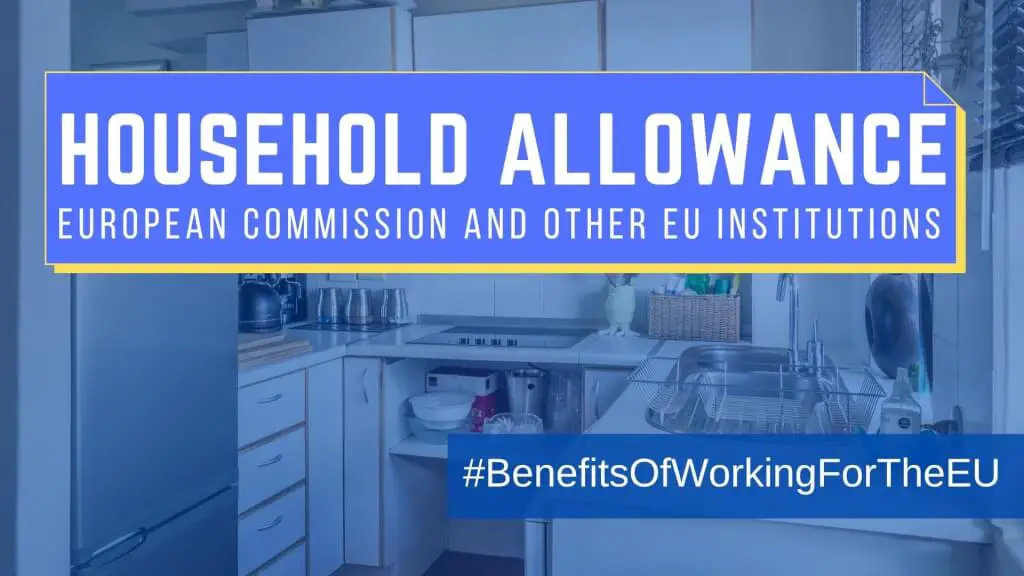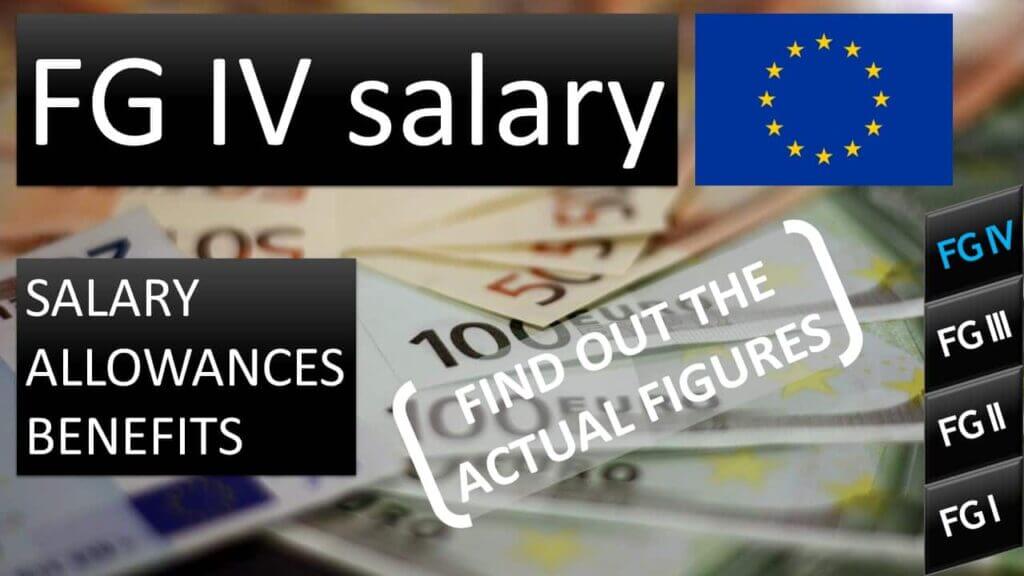Employees of EU institutions can receive a number of other benefits on top of the ‘basic salary’. One of these benefits is the the ‘Household allowance’. This article presents all key information about the Household allowance. For a full list of possible benefits that come with a job at an EU institution read this article.
Amount
The amount of the Household allowance is made up of a fixed part of EUR 192,78 EUR plus an amount equal to 2% of an official’s basic salary. Below are sample calculations of the Household allowance for a number of common staff:
- FG III Household allowance is EUR 248.34 = EUR 55.56 (2% of the basic salary 2777.78) + 192.78 fixed part
- FG IV Household allowance is EUR 263.90 = EUR 71.12 (2% of the basic salary 3555.98) + 192.78 fixed part
- AD 5 Household allowance is EUR 291.13 = EUR 98.35 (2% of the basic salary 4917.29) + 192.78 fixed part
Staff entitled to the Household allowance
There is only one condition to become entitled to the Household allowance – the employee of an EU institution has to be one of these:
- married
- in a registered partnership (both opposite and same-sex partnerships are treated equally) recognized by any of the EU member states
- with at least one dependent child
Legal excerpt
ANNEX VII Remuneration and reimbursement of expenses
FAMILY ALLOWANCES
Article 1
1. The household allowance shall be set at a basic amount of EUR 196,44, plus 2 % of an official’s basic salary.
2. The household allowance shall, be granted to:
(a) a married official;
(b) an official who is widowed, divorced, legally separated or unmarried and has one or more dependent children within the meaning of Article 2 (2) and (3) below;
(c) an official who is registered as a stable non-marital partner, provided that: (i) the couple produces a legal document recognised as such by a Member State, or any competent authority of a Member State, acknowledging their status as non-marital partners, (ii) neither partner is in a marital relationship or in another non-marital partnership, (iii) the partners are not related in any of the following ways: parent, child, grandparent, grandchild, brother, sister, aunt, uncle, nephew, niece, son-in-law, daughter-in-law, (iv) the couple has no access to legal marriage in a Member State; a couple shall be considered to have access to legal marriage for the purposes of this point only where the members of the couple meet all the conditions laid down by the legislation of a Member State permitting marriage of such a couple;
by special reasoned decision of the appointing authority based on supporting documents, an official who, while not fulfilling the conditions laid down in (a), (b) and (c), nevertheless actually assumes family responsibilities.
3. If the spouse of an official is gainfully employed, with an annual income, before deduction of tax, of more than the basic annual salary of an official in the second step of grade AST 3 weighted at the rate for the country where the spouse carries out his or her occupation, the official entitled to the household allowance shall not receive this allowance save by special decision of the appointing authority. The official shall, however, be entitled to the allowance where the married couple have one or more dependent children.
4. In cases where, under the foregoing provisions, a husband and wife employed in the service of the Union are both entitled to the household allowance, this shall be payable only to the person whose basic salary is the higher.
5. If the official is entitled to the household allowance only by virtue of paragraph 2 (b) and a person other than the official has by law or by an order of court or of the competent administrative authority been given custody of all his dependent children within the meaning of Articles 2 (2) and (3) below, the household allowance shall be paid to that other person in the name and on behalf of the official. This condition shall be deemed to be fulfilled in the case of dependent children who have reached their majority if such children have their normal residence with the other parent.
If, however, the official’s children are in the care of several different persons, the household allowance shall be divided among them according to the number of children in their care. If the person eligible by virtue of the foregoing to receive the household allowance paid in the official’s name is also eligible to receive this allowance by reason of his or her own status as official or other member of staff, that person shall receive the higher of the two allowances only.
Do you have question or suggestion for this article? Please share in a comment below and let’s make this resource better for you and other readers!
Sources:
This article is based on the European Commission Staff Regulations and other publicly available information such as EU institutions’ vacancy announcements.







31 responses to “Household allowance”
Hello,
My very long time partner started a job at an EU institution a couple of months ago and is therefore still on probation period. We are not married so are not entitled to the household allowance. Will we be entitled to it if we get married before the end of the probation? (And before I relocate there too, as I am still in france, finishing a job contract)
Many thanks
Hello, I have a question: a EU citizen, Italian, married with a Chinese woman, with a dependent child, is entitled to get the house allowance? Thank you for the reply.
As long as you can give an official proof YES.
I am 65 years old and have just become a widower, Do you know if I still will get the household allowance. I am a 100% disabled. Thank you very much. No children
Hi!
Thank you very much for this very useful post!
I have a question – my partner and I, who live together, will get legal cohabitation in Belgium (not marriage). Does this figure allow familly allowances?
Thank you in advance!
Official cohabitation counts as family and entitles you to the allowance.
In case it’s relevant to anyone, same sex couples also get the same treatment provided their union is recognized under the national law on an EU Member State.
Suppose you are divorced, and have joint custody of your 2 children (half week with each parent). Both parents work for EU institution but so far only one receives the household and child allowance (normal). How will that turn out in terms of household allowance and dependent child allowance? Will each parent receive half of those allowances?
It’s an interesting question to which I don’t know the precise allowance.
If both parents work for EU institutions and are not divorced, they have to decide who gets the allowance (usually the higher-paid parent as the household allowance is a % of basic salary). I assume that in case of divorce and shared custody, parents have to decide who gets the allowance, and this is taken into account by the court when calculating child support payments from the other parent.
Hi all!
I have a question regarding household allowance. I will start working at the EC next month and I will relocate to Luxembourg together with my partner. We had already planned to enter into a civil partnership before moving to Lux but I was recently told that civil partnership is not equal to marriage for the purposes of the EU institutions when it comes
to heterosexual couples ( i.e. I will not be entitled to the household allowance)- and that I will have to get married instead. Could anyone confirm if this is true? Thank you very much in advance!
Hello Sara, I’m in the same situation. Did you manage to find a solution for this case? That is, to be entitled to household allowance while in a heterosexual civil partnership?
I was wondering whether the provisions of point (d) of Article 1(2) of Annex VII of Regulation No 31 (EEC) could be applied in this case.
” by special reasoned decision of the appointing authority based on supporting documents, an official who, while not fulfilling the conditions laid down in (a), (b) and (c) , nevertheless actually assumes family responsibilities.”
I was also told by HR that for heterosexual couples the household allowance is only given to married couples. This also applies to all other benefits that are given to someone with a spouse (or civil partner, but only for homosexual couples), e.g. higher settlement allowance, daily subsidence allowance for longer.
Other colleagues were also told the same.
Yet another example of how the EU institutions are falling behind any modern workplace. It seems that the Commission prefers people to marry because they are more stable and therefore loyal to the institutions. What a stale, prehistoric set of policies and values!
Hi! Please check again with HR and maybe also contact PMO, the Paymasters Office. You can also do this retroactively once you take up your duties.
In general, if the civil partnership status is equalized to marriage in the particular member state, it should be recognized by the EU institution.
We (me and my heterosexual partner, also working for the EU) have recently asked the question, in order to see if it’s worth entering into the cohabitation légale for these reasons. Sadly, the response was the same – though officially stated otherwise, heterosexual couple only get the HH allowance if married and nothing else (e.g., common law) counts – they confirmed that this was only meant for homosexual partners who cannot get married.
Roman & others – many thanks for sharing your experiences!
I wonder if this is only the Commission Practice, or also in EU agencies. Will look into this!
Hi all,
There is any restrictions regarding moving my family in the country where I am employed during my probation period or should it be done when the probation period will end, after I will sign my contract? This decision will impact the child’s allowances, daily subsistence allowances household allowance or other entitlements?
I intend to come alone in the beginning, to settle the administrative, housing and schooling stuff, to make the resettlement easier for my family.
Thank you in advance for your advice!
AAP
Alexandru, hi! You are allowed to move with your family during the probation period. Considering that probation is usually 9 months which is basically one school year, most families relocate together. What’s the worst than can happen? Of course, if you don’t pass your probation, however, chances of that are very very small. As far as I’m aware, the time by which your family relocates with you to the place of employment does not impact entitlement to allowances.
You have stated in one of your replies that you are not elegible for the household allowance if the family is not relocated to the country where the EU institution is located. However, after reviewing the Staff regulations I can’t find any paragraph about this. The reference you are making is regarding the installation allowance, and not the household allowance (article 5.4). This should mean that you are entitled to the house hold allowance if you have kids and are married but the family is left behind. Am i missing something?
Hi,
while going through the pre-employment process with HR, I was advised that the household allowance would not apply to heterosexual couples who are in a civil partnership.
This is verbatim what I was told by HR
“As for the civil partnership, you will not be entitled to get the household allowance, as according to the Status, you should be in a situation where you do not have access to marriage.”
Hello Ben,
I reviewed the Staff Regulations, specifically: ANNEX VII Remuneration and reimbursement of expenses –> Section 1 FAMILY ALLOWANCES –> Article 1, and I could not find any statement as to why an employee who is a national of the same country the EU institution is located, should not be entitled of the household allowance.
Were you (or perhaps someone else) able to find the specific statement(s) in the Staff Regulations that a Household Allowance is only available to an employee who is not a national of the same country where the EU institution is located?
Thanks!
Dear Roger,
Thanks for drawing my attention to this. I just checked the Staff Regulation and you are right – all EU employees who are either married or in a civil partnership or with at least one dependent child are eligible. Will adjust this and other articles on the website.
Hi Ben,
I reviewed the Staff Regulation – specifically “Annex VII – Remuneration and reimbursement of expenses” –> “Section 1 Family Allowances” –> Article 1 that speaks to the household allowance, but I cannot seem to find a reference that a national of the same country the EU institution is located, should not be entitled of the household allowance.
Perhaps I missed the reference. Have you, or anyone else had any luck finding the statement that Household allowance does not apply to nationals of the same country the EU institution is located?
Hi,
Just wondering about the household allowance again. Does anyone know if you are entitled to the household allowance and dependent child allowance if your family does not intend on moving to Brussels? Bearing in mind there would be a lot of travel between the two countries.
Also, when you use eu salary calculators online, they show you the net salary. Is this after all deductions?
Once you are working there a while, is it possible to negotiate flexible working arrangements, such as one day off per week or per fortnight?
I am trying to work out of a career in the EU would be manageable if my family were to remain in Ireland. Thanks
Declan, hi! Thanks for the important questions, this is something that concerns many people who consider employment in EU institutions. Let me try to answer one by one.
1) Household and child allowances – you would get the child allowance automatically as you have children, however, to get the household allowance you have to prove that the whole family has relocated.
2) Salary calculator – As far as I know there are no reliable EU salary calculators online. Europol used to host the European Commission salary calculator on their website, but that got removed in 2021. You can only get access to the salary calculator once you are employed at an EU institution (or you can ask a friend who works for an EU institution to do a calculation for you). The actual European Commission salary calculator shows salary before and after deductions.
3) Teleworking – currently staff of EU institutions are entitled to 60 teleworking days annually, however, teleworking has to be done from the place of employment usually, in your case Brussels. There is talk that the European Commission might increase it up to half of the annual working days (~120-180), but it is not known if people would also be allowed to work from other EU locations.
In my working career I’ve heard of only one instance where the employee was upfront about willing to telework every 2nd week from his home country and was able to negotiate this successfully. If the institution really wants to employ you, they might agree to this, but you have to be ready to walk away from the employment offer. If you don’t manage to agree on this from the start, you will have to abide by regular teleworking rules later.
Best of luck! If you manage to negotiate permanent telework from Ireland, would be great if you let me know how the negotiation went!
Hello! I am starting soon a job in EU Commission. I am married with kids but first I intend to go alone (without husband, kids) in order to make it easier for all of us. So my questions are:
1) Do I still have the right for household allowance?
2) What about daily allowance? Do I have the right to receive it for 10 months despite the fact that firstly I am going to be the only one registered to the new country?
3) The daily allowance is paid at the same time with your salary from the first month or after the probationary period?
Sorry for so many questions. I really appreciate your help!
Thanks in advance Ben!
Hi! In your case it really makes sense to look through the Staff Regulation and do a search for household allowance. But after that you would anyway better check it with HR as the rules are quite arcane and sometimes makes sense of for the lay person.
Answer to Q1) Nevertheless, my search of the Staff Regulation revealed this paragraph: “An official who ►M25 is entitled to the household allowance ◄ and does not settle with his family at the place where he is employed shall receive only half the allowance to which he would otherwise be entitled; the second half shall be paid when his family settles at the place where he is employed, provided that it does so within the periods laid down in Article 9 (3).” Hence, the allowance will most likely be impacted by your family not yet moving to your place of employment.
Answer to Q2)
Again a quote from Staff Regulations: “The period in respect of which the daily subsistence allowance is granted shall be as follows:
[…](b) in the case of an official ►M25 ►C16 who is entitled to the household allowance ◄ ◄ : 180 days or, if the official is a probationer, the period of probation plus one month.” I didn’t find a mention anywhere in the Staff Regulations that the daily allowance would be impacted by whether your family has relocated or not. My personal experience also has been that I have received the full Daily Subsistence Allowance despite my family not yet having moved with me in the first months of the new job.
Answer to Q3) DSA is paid from the start of your probation period. Usually it is the 2nd month as most institutions only manage to pay you the basic salary at best in the first month as they cannot not calculate and process all of your entitlements so quickly. So – be prepared for a leaner income in the first month, but then a compensatory payment in the 2nd month.
Sorry for the delay in answering you, I hope the reply is still useful.
Suppose you are divorced, and have joint custody of a child (alternate weeks with each parent). going to work for the EU, how will that turn out in term of howsehold allowance? the child will stay with the other parent, because its impratical to move between countries, will it still be considered as a dependent?
Hi all,
Do we know if ‘household’ and ‘dependent child’ allowances are subjected to correction coefficient like daily subsidiary allowance?
Yes, unfortunately, all allowances are also indexed.
I don’t understand why an employee who is a national of the same country the EU institution is located, should not be entitled of the household allowance, considering that the expatriation allowance is already there for expats.
Indeed, it is sometimes hard to decipher the logic behind the rules. I think I’ll add the respective Staff Regulation articles to the post so that everyone can see for themselves and in case there are any additional details that didn’t seem relevant to me.